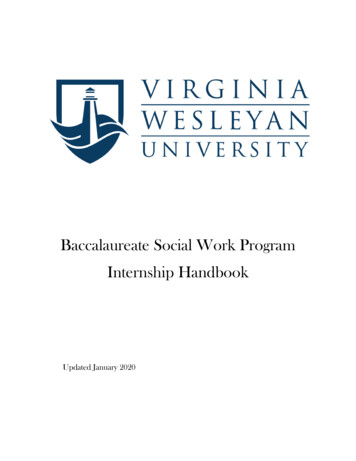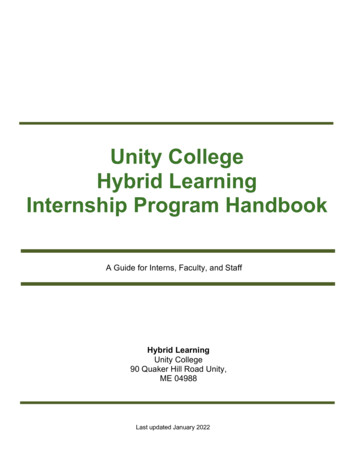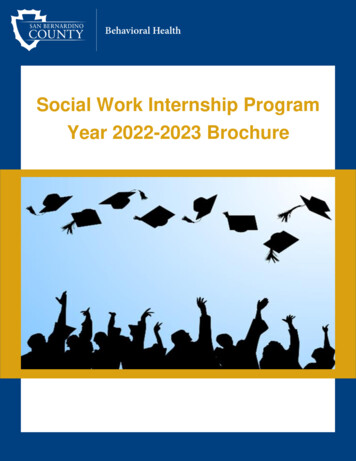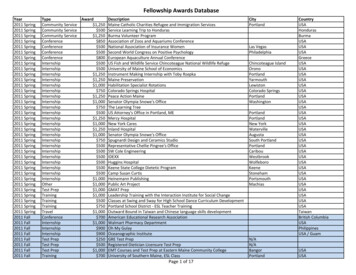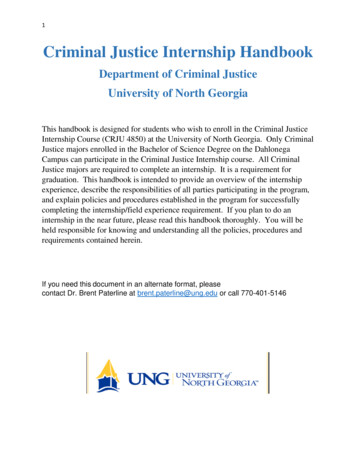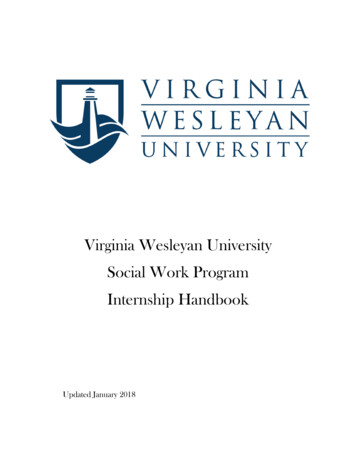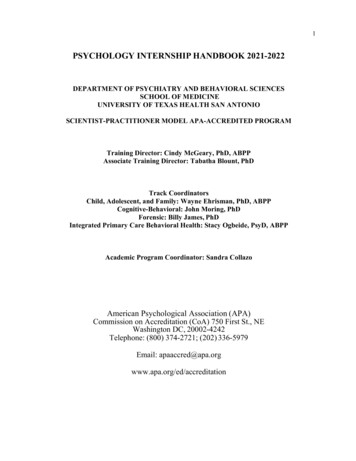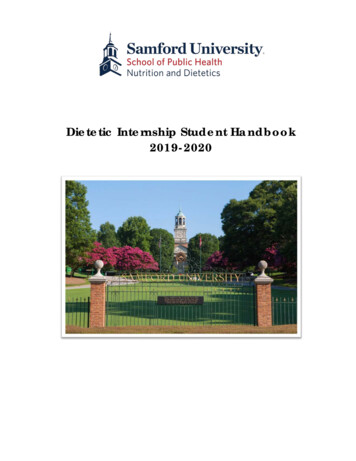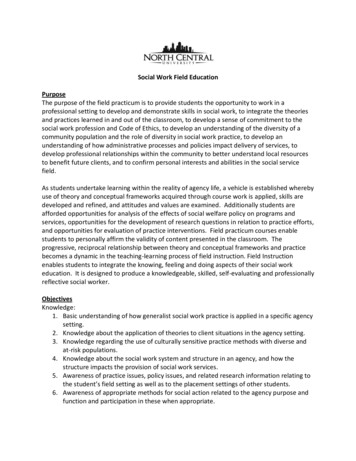
Transcription
Social Work Field EducationPurposeThe purpose of the field practicum is to provide students the opportunity to work in aprofessional setting to develop and demonstrate skills in social work, to integrate the theoriesand practices learned in and out of the classroom, to develop a sense of commitment to thesocial work profession and Code of Ethics, to develop an understanding of the diversity of acommunity population and the role of diversity in social work practice, to develop anunderstanding of how administrative processes and policies impact delivery of services, todevelop professional relationships within the community to better understand local resourcesto benefit future clients, and to confirm personal interests and abilities in the social servicefield.As students undertake learning within the reality of agency life, a vehicle is established wherebyuse of theory and conceptual frameworks acquired through course work is applied, skills aredeveloped and refined, and attitudes and values are examined. Additionally students areafforded opportunities for analysis of the effects of social welfare policy on programs andservices, opportunities for the development of research questions in relation to practice efforts,and opportunities for evaluation of practice interventions. Field practicum courses enablestudents to personally affirm the validity of content presented in the classroom. Theprogressive, reciprocal relationship between theory and conceptual frameworks and practicebecomes a dynamic in the teaching-learning process of field instruction. Field Instructionenables students to integrate the knowing, feeling and doing aspects of their social workeducation. It is designed to produce a knowledgeable, skilled, self-evaluating and professionallyreflective social worker.ObjectivesKnowledge:1. Basic understanding of how generalist social work practice is applied in a specific agencysetting.2. Knowledge about the application of theories to client situations in the agency setting.3. Knowledge regarding the use of culturally sensitive practice methods with diverse andat-risk populations.4. Knowledge about the social work system and structure in an agency, and how thestructure impacts the provision of social work services.5. Awareness of practice issues, policy issues, and related research information relating tothe student’s field setting as well as to the placement settings of other students.6. Awareness of appropriate methods for social action related to the agency purpose andfunction and participation in these when appropriate.
7. Awareness of social service resources in the area to enable students to broker servicesto enhance client functioning and well-being.Skills:1. Enhancement of interviewing skills to enable the student to develop workingrelationships with diverse types of clients and client groups, to formulate initial and ongoing assessments at the micro, mezzo, and macro levels, and to modify relationshipstyles to fit the client situation.2. Ability to prepare an appropriate intervention/service plan for actual clients based onperson-in-environment and strengths assessment and the availability of agency services.3. Increased self-awareness of the student’s own intrapersonal and interpersonalattributes that enhance or interfere with therapeutic relationships or the social workrole.4. Application of practice and program evaluation skills for purposes of accountability,outcome monitoring, improvement of practice, and program development.5. Development of the ability to use supervision in an appropriate manner for continuedgrowth and development.6. Development of the ability to work collaboratively with a variety of helpingprofessionals.7. Development of appropriate documentation skills within the agency setting which areclear, organized, and meet professional standards for the profession and the particularagency setting.Values:1. Respect for an individual’s worth and dignity and their unique characteristics.2. Importance of advocating for the client with organizations and systems to ensureprotection of rights and procurement of needed resources.3. Appreciation for professional ethics, especially confidentiality, regarding clients, peers,agencies, and recognition of the individual’s right to self-determination and activeparticipation in the helping process.Structure for Field PracticumThere are two semesters of field practicum for all social work majors. Students typically enterfield their senior year. Students complete both semesters of field concurrently in the sameagency unless there are extenuating circumstances which necessitate a change.SWK 488: Internship Practicum I and SWK 489: Internship Practicum II each require 225documented hours, for a total of 450 hours of agency work over the course of two semesters.Even if a student completes 250 hours prior to the end of either semester, that student isrequired to complete 15 weeks of field placement during both the fall and spring semesters.Students may accumulate internship hours between the fall and spring semesters. Thisarrangement must be made with the field instructor and approved by the NCU FieldCoordinator. If this situation should occur, students may count accumulated hours toward thespring semester, but will still be responsible for completing the 15 week internship at a reducednumber of hours per week. Students are not required to work during fall or spring holidaybreaks or final exam weeks; however, they may choose to schedule hours with the agencyduring these periods.
SWK 488: Internship Practicum I and SWK 489: Internship Practicum II, meet weekly throughoutthe entire period of the field placement. In addition, there are other required social workcourses students take each semester (Fall: Pysch 460 – Research Methods and Spring: Psyc 495– Senior Project).The NCU Field Education Coordinator, in conjunction with the student, and the agency fieldinstructor, will make decisions regarding students’ changing agency placements at any point.Field Practicum SeminarDuring a student’s field placement, he/she participates in a weekly Field InstructionSeminar. The seminar serves a very useful function by combining students from a varietyof field of practice settings. This enables the student to have a broader perspective in termsof practice settings, client populations, and treatment methodologies than they might nototherwise experience.Each seminar class is organized around a theme, such as racism within society, the value ofpractice evaluation and evaluation techniques which can be easily implemented and enrichpractice, sexism within the profession, and goal setting and contracting with clients. Thestudent may be assigned readings related to each topic. Discussion is geared towardenhancing students’ experiences in their internship, assisting them in making linkagesbetween the knowledge they have obtained in the classroom and their experiences in thefield, and facilitating their ongoing professional development.A weekly component of each field seminar is a group discussion of the student’s experiencesduring the week. The discussions enable the student to share the high points and low pointsof their week, successes and frustrations. The students serve as a support system andprovide constructive feedback to each other. This aspect is considered by the students to bean especially valuable component of the class.In addition to the discussions, there are written components to field instruction seminars.For instance, students are required to submit weekly logs in which they describe andanalyze the activities of the week in their field placements. Confidentiality of clients isprotected as identifying information is omitted. Each student is required to do acomprehensive analysis of the policies that operate in the agency. All assignments and thegrading scale are identified in the course outline.Individualized Learning PlanIn addition to the goals and learning objectives of the Internship Practicum, it is very importantthat each student be aware of and verbalize individual goals for field instruction which arepertinent to personal learning needs and the particular field agency. Near the beginning of eachsemester of placement, the student develops an individualized learning contract that includeslearning goals, objectives, activities/tasks, and evaluation measures that address areas ofprofessional knowledge and skills in need of development or improvement. Agency fieldinstructors and the NCU Field Education Coordinator are available to assist students with thisprocess.
Students complete three copies of the Individual Learning Plan. One copy is submitted to theagency field instructor and one to the faculty liaison. The third copy is to be retained by thestudent. The learning goals can be modified or others added at any time during the placement,and progress toward goals is evaluated at regular intervals.Recommended Field Learning ExperiencesEach field agency offers a unique opportunity for students to experience social work in all itsmany facets. Populations served will vary as will the make-up of the staff and the types ofservices provided. Within this broad range of field learning experiences, it is highlyrecommended that certain types of experiences be made available to students in fieldinstruction settings.The following is a list of recommended field learning experiences: Orientation to the agency — includes staff, facility, office procedures, filing system, types ofservices provided, agency’s place in the social service network, methods of intervention,etc. Experiences in developing and managing effective interventive relationships — includesopportunities for students to observe a number of staff with their own individual styles ofintervention, participation in a variety of helping relationships, and the use of supervision toassist students to determine how they can develop an effective working relationship with avariety of client systems. Recording experience — includes case summaries, letters to clients and other agencies,process recordings of interviews, and eventually direct entry of students’ recordings intothe agency’s records, etc. Administrative experiences — includes observation/participation in staff meetings, fundinghearings, public relations functions, budget planning, grant writing or reading grants alreadyfunded, lobbying efforts, board meetings, contracting requirements, etc. Experience in resource/referral management — includes overall orientation to servicesavailable to client population being served by the field agency; telephone contacts withother agencies providing support services to clients; scheduled visits to key agencies withwhom linkage for clients is most common; and learning procedures for effective referrals. Interviewing experiences — includes observing, planning, and conducting interviews for avariety of purposes (intake, with staff, for volunteer programs, assessment, intervention,etc.), with diversified client systems in a variety of places (agency, home, school, hospital,etc.) The use of process recordings, observation, and tape-recorded sessions provides thefield instructor with data to aid students in further developing interviewing skills.
Experience with procedures for evaluation of individual practice and agency programs —includes designing a plan for evaluating own practice, client progress, and effectiveness ofinterventions; data collection and analysis; becoming familiar with procedures for agencyprogram evaluation; and conceptualizing/ developing a system for program evaluation ifnone exists, such as evaluation of service by clients. Experience with groups — includes observation and participation in groups such as clientgroups, staff meetings, client staffings, and groups available in the broader community forthe purpose of developing an understanding of group processes and skill in interacting ingroups as a member or facilitator. Experience in community activities — includes observation and/or participation inassignments that facilitate understanding of the community and its social service network,the field agency’s role in the community, as well as assignments that draw attention tounmet community needs and provide opportunity for community planning.All learning experiences have, as a long range goal, the opportunity for students to developincreased skills, a greater level of independent functioning, and the development of a sense ofprofessional identity with its accompanying values and guidelines under which the professionoperates. Enabling the student to learn to utilize the supervisory relationship is central to thestudent’s growth in this area as well as all the other areas recommended for field learningexperiences.These suggestions can provide the student with sufficient opportunities to experience all facetsof the agency as well as to create a structured learning experience. Other experiences ofparticular interest to a student can be incorporated into the student’s individual learning goalsand contract at any time during the placement.
Placement ProceduresChoosing a Placement SiteIn the spring semester of their junior year, social work majors will meet individually andcollectively with the NCU Field Work Coordinator. During this meeting students will receiveinformation regarding how to choose a placement site along with a current list of potentialinternship sites. Additionally, discussion will include the student’s interests, prior experience,career goals, and scheduling. Students are encouraged to think early about their interests andbegin sending out resumes/setting up interviews soon after their advisement since there isoften competition for field sites from their fellow students, other programs at NCU and otheruniversities who have both undergraduate and graduate students looking for field sites.No student may make contact with a practicum site not on the list without the written approvalof the NCU Field Work Coordinator which indicates that the site is acceptable as a potentialfield work site.To prevent dual relationships, students may not choose an internship site in an agency in whicha family member or close friend will be in a supervisory position over them or in which a familymember or a close friend is a client receiving services.Selection of Field InstructorsAgency-based field instructors for SW students have the primary responsibility forsupervising students in their agency sites, including developing learning assignments,providing regular supervision, and evaluating mastery of field learning goals. Qualified fieldinstructors must meet the following criteria: The field instructor's professional philosophy, goals and objectives must be consistentwith those of the social work profession.Field instructors must have demonstrated competency in their area(s) of practice, asindicated by holding a masters degree from an accredited school of social work; agraduate degree from an accredited program in an allied discipline that teachescounseling; or a BSW from an accredited undergraduate program and two years ofsupervised experience. Potential field instructors with other qualifications should consultthe NCU Field Education Coordinator.If the field instructor does not have a social work degree, the field education programseeks to provide expanded professional supervision of students in the following ways:— Designation of a social work mentor within the agency setting if such a person isavailable. The mentor should be an employee of the agency with a social workdegree who is willing to meet regularly with the student to expand and further theirsocial work perspective and experience. A less preferred option would be a personwith a social work degree employed by another agency. In the absence of a social work mentor, the student would have additional contactwith the NCU Field Work Coordinator on a regular basis in order to expand on thestudents’ integration of the social work perspective. This contact would occur at leastevery two weeks and more often if needed.
The field instructor must demonstrate commitment to his/her own professionaldevelopment. Such commitment may be indicated by professional affiliations,participation in continuing education courses, workshops, and seminars in order toenhance and update practice skills, community involvement and leadership, innovationin service delivery, etc.Field instructors must accept the validity of undergraduate education in social work asthe entry-level educational requirement for professional practice.The field instructor must be willing and able to devote sufficient time to: Participate in the student's educational program by reviewing curriculum materials. Plan student learning experiences consistent with the objectives of the social workprogram. Provide the student with appropriate, regularly scheduled supervision for all activitiesin which he/she is involved. Confer at stated intervals with the appropriate faculty.Arranging a PlacementIt is the student’s responsibility to contact agencies to request placement. The NCU Field WorkCoordinator will provide direction/guidelines for preparing and sending resumes to potentialsites. Students are encouraged to interview with at least two agencies. Students are advised totreat the process like an employment interview.Confirming a PlacementWhen a placement is confirmed with a practicum site/student, the student will provide the NCUField Work Coordinator with the name and address and contact information for the site. AField Placement Agreement form will then be sent out for appropriate signatures. Students arealso advised to send the field work supervisor a thank you note confirming arrangements forthe practicum.The student should also talk with the field site supervisor to determine if specific preparation isrequired prior to beginning the field work placement. This may include readings, having certainmedical clearances, or being cleared by required background checks/finger printing. Several ofthese processes require several weeks to complete and may need to be done prior to beginningthe field work experience so that the student is able to begin field work on time.Prior to the beginning of the placement, the NCU Field Work Coordinator will send a packet ofinformation to the practicum field supervisor, including the Internship Practicum Manual, FieldLearning Plan, and Student Performance Evaluation Form.Practicum Evaluation - agencyStudents will be asked to evaluate their field practicum experience at the end of the semester.This information will be utilized as part of the NCU SW Program’s evaluation process ofapproved practicum sites as well as being available for use by prospective interns in selecting apracticum site.Students are also asked to evaluate the teaching effectiveness and strategies of the field sitesupervisor. This information is compiled and shared with the field site supervisor after grades
for the field work practicum have been finalized and sent to the University registrar. Thisevaluative data is used by the field site supervisors to enhance their teaching of interns and bythe NCU Field Work Coordinator to plan for future training topics for all field site supervisors.Practicum evaluation – studentIt is recommended that the field site supervisor and the student review the evaluation toolused in the practicum as one of the first tasks of their supervisory sessions. This will help focusthe teaching and learning of both parties. The field practicum is graded on an A – F scale. Thisgrade will be determined by the NCU Field Work Coordinator with input from the field sitesupervisor.The NCU Field Work Coordinator will meet with the student and the field site supervisor at leasttwice during the semester and more frequently, if needed. The regularly scheduled meetingswill occur around mid-semester and again at the end of the semester. The student evaluationform should be completed prior to the evaluation meeting.Student’s final grades will be determined by the overall evaluation from the agency andprogress made on their learning plans that are developed early in the semester. (Learning planscan and should be modified throughout the semester with mutual consent from the student,faculty, and NCU Field Work Coordinator.)If, at the midterm evaluation meeting, the field supervisor and Field Work Coordinator agreethat the student is not displaying appropriate social work skill and therefore at risk of failing thePracticum, the student (with input from the field supervisor and Field Work Coordinator) mustwrite a corrective action plan to address deficient areas. This plan must be signed by thestudent, field supervisor, and the NCU Field Work Coordinator.Responsibilities of the NCU Field Work Coordinator Include: Assist students with selecting appropriate field work sites Conducting the weekly practicum seminar Meeting with the student and field site supervisor at least twice during the semesterand more frequently if requested/needed by the student or the field work supervisor Assisting the student and field site supervisor in the evaluation process and assigningthe final grades Providing resources for the student and field instructor that will enhance the learningprocessResponsibilities of the Student Include: Sending out resumes and arranging for an interview with one or more potential fieldplacements Arranging a schedule with the site supervisor Keeping track of hours worked on a Practicum Timesheet Assuming the responsibility for completing all assignments including the writing of theLearning Plan
Acting in a professional manner at the agency. This includes following the NASW Codeof Ethics, notifying the field supervisor of any absences in a timely manner, and keepingappointments with clients and agency staff meetings with the field site supervisor. Italso includes following all agency rules and regulations and federal and state lawsParticipating in the evaluation of her/his learningCommunicating with the field site instructor about his/her learning needsCommunicating with faculty about learning needs or problems in the field placementCompleting forms to evaluate the field practicum and the field site supervisor’s teachingat the end of the placement.Responsibilities of the Field Site Supervisor Include: Interviewing students and determining their appropriateness for the field site Being familiar with the objectives and procedures of the NCU Social Work Program fieldwork program and with the Practicum Manual Informing necessary staff in the agency of the student’s learning plan Orienting the student to the agency Assisting with the formation of the student’s learning plan Scheduling and holding regular supervisory sessions with the student (minimally 1 houra week) Informing the student of any known or suspected dangers in the agency practice settingand assisting the student to prepare a personal safety plan if needed Providing regular feedback to the student Contacting the NCU Field Work Coordinator if the need for additional visits to the siteare needed or if there are any problems needing attention Attending the presentation of Senior Projects by the SW students at the end of thespring semester, if possible Providing the NCU Field Work Coordinator with current information regardingbackground and credentials as a social workerPolicy for Students Completing a Practicum in an Agency in Which They are Also EmployedStudents who wish to complete their practicum placement in an agency in which they areemployed must work closely with the NCU Field Work Coordinator to ensure that the agencymeets the standards for an approved agency and that the student can receive a quality relevantlearning experience with appropriate supervision. The agency must agree to adequate releasetime for the student to attend the seminar portion of the class (once a week to be determined).Agencies must understand that student assignments and field work supervision should differfrom those associated with the student’s employment and must be responsibilities that wouldbe given to a bachelor degree educated staff member. Agencies must take care that the fieldduties are educationally focused and that there is not diminution of the program’s establishedrequirements in seminar and field practicum
Policy for Students Using Their Own Vehicles to Conduct Business of the Field AgencyThe SW program does not require or encourage the use of personal vehicles by students toconduct agency business such as transporting clients. If a student chooses to do so, he/shemust carry personal automobile insurance that includes the use of the vehicle for businesspurpose.Malpractice and Liability CoverageNCU assumes the coverage for student malpractice insurance which is not included on theagency’s blanket policy. Other liability should be included in the agency policies and studentsmay wish to obtain malpractice insurance on their own, as well.Mission of the NCU SW ProgramThe Social Work Program at North Central University will train students in the knowledge andskills of social work practice. The program is guided by a love for Christ and a commitment toservice to God and to humanity. Our educational framework is based on the Council of SocialWork Education (CSWE) requirements, Christian values, the National Association of Social Work(NASW) Code of Ethics, the National Association of Christian Social Workers (NACSW)statement of faith and practice, a liberal arts foundation, as well as a biblical foundation. Wevalue a holistic approach to social work that includes the mind (knowledge), the body (practice),and the spirit (faith).Social Work Program Mission Statement The social work program’s mission is to preparestudents in the knowledge, application, and integration of generalist social work values andpractice in the context of a Christian worldview that emphasizes social justice, human dignity,and service.Social Work Program Goals and Competencies:KnowledgeGoal 1: Provide students with a sound base of knowledge that informs generalist social workpractice.Core Competencies:Students will demonstrate competency in the following areas of knowledge:1) the history, philosophy, value, ethics and scope of practice of social work2) the theories of human behavior in the context of person-in-in environment.3) the diverse nature of societies and culture and how that shapes the humanexperience4) the history and mechanisms of oppression and discrimination5) the complexities of populations at risk and underserved populations6) the history of social welfare7) contemporary issues related to social work8) the importance of social policy in ensuring social and economic well-being9) the theories and techniques related to generalist social work practice.10) research methods
SkillsGoal 2: Foster the development of skills useful for academic and professional success.Core Competencies:Students will demonstrate competency in:1) Critical thinking.2) Communication in a variety of formats.3) Using computers and other relevant technology.4) Self-reflection and identifying personal biases.5) Using strategies of ethical reasoning.ApplicationGoal 3: Develop students who are socially minded and who can engage in generalist socialwork practice with diverse systems of all sizes.Core Competencies:Students will demonstrate competency in:1) Applying social work ethical principles to guide professional practice.2) Applying critical thinking to inform and communicate professional judgments.3) Engaging diversity and difference in practice.4) Advancing human rights and social and economic justice.5) Engaging in research informed practice and practice informed research.6) Applying knowledge of human behavior and the social environment.7) Engaging in policy practice to advance social and economic well-being and todeliver effective social work services.8) Responding to contexts that shape practice.9) Engaging, assessing, intervening, and evaluating with systems of all sizes.IntegrationGoal 4: Develop students who adhere to the mission and values of the social work profession.Core Competency:To identify as a professional social worker and conduct oneself accordingly.Goal 5: Develop students who integrate faith and practice while remaining sensitive todiversity.Core Competencies:Students will demonstrate competency in:1) Applying the use of biblical values and ethics in generalist social work practicewhile remaining sensitive to the diverse nature of humanity.2) Articulating a Christian world-view and critiquing issues in social work from atheologically-informed perspective.3) Recognizing how the Christian worldview impacts social work practice
Field Learning Plan – Guidelines and ExampleDuring a field placement students will have many opportunities to assess their learning needs,set their own learning goals, and evaluate their progress. Completing the Individual LearningGoals template is an exercise to facilitate this process. The intention of this exercise is to set up“learning and doing” objectives that are specific to the field placement setting. These goalspertain to the student’s own uniqueness and changes that a student wants to make, andbehaviors that would help in the role of a professional social worker.Before determining goals for one’s own learning, it is important to spend some time thinkingabout one’s needs in the areas of social work knowledge, values, and skills. What kinds ofknowledge does a student need to learn or expand in order to function effectively in aparticular agency? For example, a student may be in a setting which focuses on substanceabuse problems and may have very limited knowledge of substance abuse issues. An obviousneed for learning would be to acquire such knowledge. Determining more specifically thetopics a student needs to cover and the best resources needed to assist in this learning willenable the stud
There are two semesters of field practicum for all social work majors. Students typically enter field their senior year. Students complete both semesters of field concurrently in the same agency unless there are extenuating circumstances which necessitate a change. SWK 488: Internship Practicum I and SWK 489: Internship Practicum II each .
